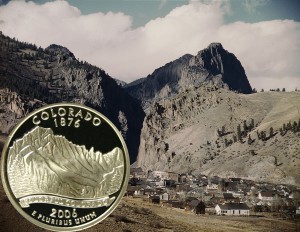Today, the Colorado State Quarter tells part of the tale of Nicholas Creede.
On this date in 1889, supposedly Nicholas Creede shouted, “Holy Moses, chloride of silver!” near the Upper Rio Grande Valley.
However, the historical tales of Creede’s discoveries vary greatly on when and how he found the various silver hoards within the Colorado Mountains.
The tales also disagree about his name change.
He was born William (Billy) Harvey near Fort Wayne, Indiana and later the family moved to the Iowa Territory.
Still a teenager, he enlisted in the Army and spent seven years as a scout traveling Nebraska, Colorado, Wyoming, Montana and the Dakotas.
At 27, he left the Army to return to his family and court the young girl that was the apple of his teenage eye.
In the years he was gone, his young crush had wed his brother, and they had a child.
Supposedly, the young man was so heartbroken that he changed his name to Nicholas C. Creede and left the Iowa Territory heading west to become a prospector.
But, there is another story about the name change.
This story claims his family was so poor they pushed young “Billy” out of their home when he turned 18.
He headed west where he became a lumberjack and a scout.
Eventually, he found his way to the Colorado mining camps.
While there, a “Billy” Harvey murdered someone in Denver.
Whether it was this Billy Harvey or someone else, our “Billy” Harvey changed his name to Nicholas C. Creede.
And, regardless of the back-story, Nicholas C. Creede did find a rich vein of silver that started the boomtown of Creede, Colorado.
During the boom, Cy Warman wrote the poem There Is No Night in Creede that described the town’s prosperity:
Here’s a land where all are equal
Of high or lowly birth –
A land where men make millions
Dug from the dreary earth.
Here meek and mild eyed burros
On mineral mountains feed,
It’s day all day in the day-time
And there is no night in Creede.
The cliffs are solid silver
With wondrous wealth untold,
And the beds of running rivers
Are lined with purest gold.
While the world is filled with sorrow,
And hearts must break and bleed,
It’s day all day in the day-time
And there is no night in Creede.
Mr. Warman also wrote a book called The Prospector: Story of the Life of Nicholas C. Creede. Written while Creede still lived, Warman offered a different and in-depth view of the man’s life and does not talk of a name change at all.
In looking at the different accounts, which are facts and which are embellished tales? The people with the truth no longer live.
Much like the differences in the historical notes of his life, his death also provided a mystery.
At age 54, Nicholas C. Creede died of a morphine overdose at his home in Los Angeles.
Some believed the death accidental. Others believed he committed suicide. Still others wondered if he was murdered, as it was known he took a small amount of morphine each day for pain.
In many ways, history is in the eyes of the beholder.
The Colorado State Quarter rests against a background of Creede, Colorado from the early 20th century.
